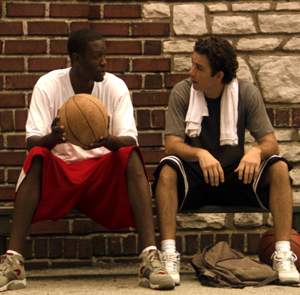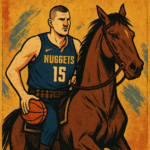 Amidst the NBA All-Star weekend festivities starting up tonight in Dallas, the independently-produced film Streetballers continues its distribution through America with a VIP celebrity/NBA charity screening and fundraiser. Set to host festivities is the Los Angeles Lakers’ Josh Powell, certainly the movie’s biggest fan (that’s his “best basketball film ever made” remark on promo material); P. Diddy will be hosting the post-screening bash.
Amidst the NBA All-Star weekend festivities starting up tonight in Dallas, the independently-produced film Streetballers continues its distribution through America with a VIP celebrity/NBA charity screening and fundraiser. Set to host festivities is the Los Angeles Lakers’ Josh Powell, certainly the movie’s biggest fan (that’s his “best basketball film ever made” remark on promo material); P. Diddy will be hosting the post-screening bash.
Streetballers premiered in 2009 and stars Jimmy McKinney, the former University of Missouri/current Deutsche Bank Skyliners guard.
The film will be going on to local premieres in Miami, Washington D.C., and New York City – so how about bringing it to The Continent, Mr. Krentz? – but is available now in a special DVD edition (including lotsa extras) along with the soundtrack via NeoFlix. Click here for the official Streetballers movie website.
Review and official trailer follow.
It’s absurd if you think about it. Basketball itself, i mean. Seriously, what are we spending so much time doing, watching, obsessing over? An amusement involving humans displaying very specialized skills with the ultimate goal of inducing a ball to complete passage through a metal ring. That’s it.
Yet, to those who play the game, to those seek to make the game a life’s calling, to those who live and die with the games, it transcends. Strong individual personalities aside, team play in basketball requires a dissolution of the ego, a submission of self to greater altruistic good, to work best. Basketball can make one a better person, can bridge gaps in communication across fear and history, can bring pride to a nation.
Why? Call it the power of love of the game. And love, as we know, is its own reward.
Streetballers is a product of love of the game, and the first feature film from independent film quadruple threat director/producer/writer/lead actor Matthew Scott Krentz. It’s a deft exploration of true-to-life characters in a visual essay on how basketball links us all. (It’s no coincidence that the PR blurb on the film’s IMDB.com page leads with “Streetballers is for basketball what Field of Dreams was for baseball,” i.e. “Defining street basketball as America’s new favorite pastime” or, as an updated Terence Mann might say, “basketball has marked the time.”)
The links are even stronger in an urban setting. In Any City, USA – okay, so it’s actually St. Louis, but this is all but deliberately concealed in the film – John Hogan is seeking to parlay his community-college balling experience into a university scholarship; he’s “a real smart player,” for sure, but the unfortunate flip side of his coach’s assessment, namely that John is also “a six-foot white guard with decent speed and little jumping ability,” is also all too true.
John has bigger problems than that of his basketball/educational/professional career as well. Older brother Michael (Patrick Rooney) has just been released from prison, where he was doing time for vehicular homicide, and has come out none the better for wear; indeed, he’s become well racist in a sort of reverse American History X move and decries basketball as “not a white man’s game anymore.”
Meanwhile, Jacob Whitmore (Jimmy McKinney) is from the, um, other half of the city. His grades are in no shape whatsoever to attend university with getting put on academic probation (all right, so some suspension of disbelief is required to buy the supposition that a University of Michigan or a UCLA wouldn’t look the other way on an academically poor basketball stud out of college, but run with it). At home, his cousin Damon (Craig Thomas, who has the Carmelo Anthony look *down pat* in this flick) is involved in a rolling snowball of debt mostly involving gambling on city hoops.
Surely, figuring out how John and Jacob will come together is fairly obvious, with John swapping Shakespeare-tutoring time for Jacob’s tips on improving his game (more on this momentarily). While some of the plot machinations are predictable, however, many more are not; and for a great majority of Streetballers’ 118 minutes, viewers are left guessing at the twists and turns.

McKinney co-stars in Streetballers
Also key to Streetballers’ artistic success – and any American film on basketball, really, if we’re honest – is how the film deals with the race issue, a subject absolutely unavoidable when addressing red, white and blue basketball. From the NBA to the universities and high schools to the streets and playgrounds, color consciousness is far more at the forefront than nearly any other aspect of life in the ‘States; it is the duty of any responsible filmmaker to somehow confront related issues that, while running deep in the American vein, are often taboo for public discussion outside of a basketball-related milieu.
Happily, Streetballers succeeds brilliantly here, too. With all the slick savvy of Ron Shelton’s White Men Can’t Jump (still the best basketball movie script of all-time) and the poetic realism of Spike Lee’s angrier joints, Krentz’ screenplay is loaded with taut observations on race relations: Sometimes funny, sometimes literally deadly serious, the dialogue on race matters is always dead on correct and lyrically perfect. Like white man Billy Hoyle having to suffer verbal slurs like “you motherfucking pilgrim” and “your momma’s an astronaut,” John gets labeled a “social experiment” as the sole white player on the court and later “ghost” one a particularly skin-crawlingly tense scene. The reaction to John’s self-description as “black Irish” is hilarious, and the depth of meaning in the final well-wishing of “Take care of yourself, white boy,” with all that has come before it, is impossible to properly convey in this review.
Best of all, Krentz The Writer realizes that even race-in-basketball is a smaller sphere compared to greater issues, resulting in exchanges like this one, which runs after Jacob gives John a few tips about smooth operatin’ and which belie the power of the screen beyond words written on a page:
JOHN: Is this a black thing?
JASON: Nah, man, it’s a man thing.
As good as Krentz’ writing gets, though, it is Krentz The Director who should take the lion’s share of kudos for Streetballers. While a speech or a line here or there may fall with a clunk – the brief early monologue McKinney gives on what the game means is an egregious example – the vision of Streetballers never wavers due to some nice directorial control on Krentz’ part.
While letting the influences proper to a thirtysomething independent filmmaker show – Spike and Shelton are at the forefront, of course, while there’s more than a bit of Kevin Smith in an outrageous sex scene and Michael’s drunken solution to answering a wee-hours phone call – Krentz happily displays his own eye as well with excellent framing in dialogue scenes and ever-more expressive ways to use the actual physical basketball court itself. And although many of the actors employed are of the Italian neo-realism school, i.e. utter amateurs taken from everyday walks of life in St. Louis and put before the camera, Krentz manages to capture a decent enough performance out of most while keeping things rolling like Steve Nash.
The basketball action is decent enough, with the split-screen/scorekeeping technique used in the game of the denouement sure to inspire imitators. Krentz is able to accentuate the plusses of working in independent film, for despite the limitations of filmmaking without a studio (yes, we’re talking financial investment and support here), the story-telling can be accentuated and the morality pleasantly not so Hollywood cut-and-dried. The soundtrack is solid, not wholly unexpectedly culminating in some nice syntheses between street beats and Irish-flavored world beat.

Language of the Street(ballers): McKinney, Krentz
As for the acting principals, Krentz himself is passable in the lead, though more range would have been nice; we know Krentz’ John is laidback but whoa is he mellow under pressure. Limited jumping ability aside, i’d get John the ball with the clock running out if he’s this cool in a game situation. Doing the Ray Allen turn, McKinney is likeable and charismatic; some of his scenes with his chronic cousin are among the film’s best. As with much of the cast, McKinney and Thomas are making their feature-film debut in Streetballers; based on the chemistry here, you’d never know it otherwise. As John’s love interest Sarah, Adrieanne Perez is wonderfully engaging, charming and sexy in appropriate amounts; Perez fills the bill perfectly here and surely has a future ahead of her if she so desires.
Shortcomings? Sure, Streetballers: The Movie has them here and there, but perhaps the two single biggest flaws came in the DVD release and would appear to be the responsibility of Krentz The Producer. On the DVD cover and in most publicity material, a critical and quite wonderful little twist, namely the true final fate of young Terry Gibson (Eric Fletcher), has been fully revealed to no good end; not much enjoyment of Streetballers is disastrously lost, but this viewer was happy to be surprised.
The second problem: Where are the subtitles? While Streetballers has not yet been released in Europe, it certainly should be. This film not only fulfills all expectations as both a sports movie and a full-on drama, but it presents an aspect of American culture rarely seen in the Hollywood product so ubiquitous on world scenes. Streetballers could easily play in Germany, in Lithuania, in Spain, in Greece … anywhere where basketball is loved.
Because basketball can be a bridge. Because basketball can mean so much more.
And because a love story is always welcome.



